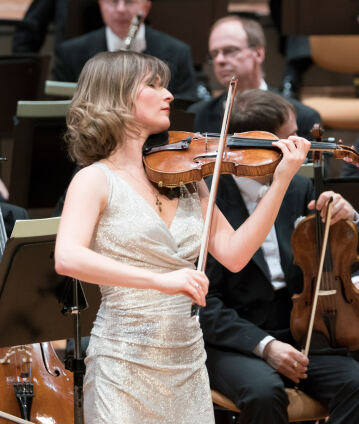Alan Gilbert and Lisa Batiashvili

Sergei Prokofiev’s Violin Concerto No. 2 is a work of compelling, pure beauty, and for its tone, which both sings and speaks, Lisa Batiashvili is the ideal interpreter. Alan Gilbert, chief conductor designate of the NDR Elbphilharmonie Orchestra, also presents Richard Strauss’s Symphonia domestica in which the composer portrays his family both humorously and musically. Gilbert also presents the European premiere of Metacosmos by the Icelandic composer Anna Thorvaldsdottir.
Lisa Batiashvili received the ultimate accolade from Alfred Brendel when she was only 22. He wrote about one of her concerts: “Every note both sang and spoke; imagination and control, warmth and mastery, rigour and flexibility were in balance.” No idiosyncrasies of regional violin schools – not the Russian or that of Dorothy Delay of New York – diverted from what the music itself had to say, wrote Brendel at that time, and continued: “The reader may now think that there is a lack of profile or personality? Or of intimacy, intensity, sensual beauty? Not at all. It’s got everything, in all its complexity, in perfect balance. [...] It burns from within, but never gets out of control.” Today, Lisa Batiashvili is one of the foremost violinists of her generation. Talking about the Berliner Philharmoniker, she has said: “It is probably the only orchestra in which so many strong personalities can sit together and each one alone can perform an incredible feat which then becomes such a tremendous unity. No matter what you play, you have the feeling that from the first to the last desk, everyone has the same idea in mind.”
The violinist will play Prokofiev’s Second Violin Concerto, a thoroughly lyrical work in which the Russian composer utterly renounces the motoric and grotesque moments that characterised his first concerto of the genre. As early as March 1930, Prokofiev announced in an interview with the Chicago publication Music Leader: “The days when dissonances were used for the sake of dissonance are over. [...] A new simplicity – that’s Modernism today.”
The concert, conducted by Alan Gilbert, opens with Metacosmos, an iridescent sound sculpture by the Icelandic composer Anna Thorvaldsdottir, who was awarded the Marie-Josée Kravis Prize for New Music at the New York Philharmonic in 2018. The work will be heard in Europe for the first time in these concerts. The programme closes with Richard Strauss’s Symphonia domestica, a parodic “family scherzo with double fugue”: three themes, “Papa returns from his trip, tired”, “Mama” and “Bubi, a mixture, however a greater similarity to Papa”, describe walk and cosy “family table” until “Mama [...] puts Bubi to bed” and “Papa et Mama seuls” can enjoy their “scène d’amour”. With artistic extravagance, Strauss captured the simple subject in a highly artificial musical structure: with a tremendous variety of brilliantly orchestrated melodies which unfold before the listener.
© 2019 Berlin Phil Media GmbH
Related interviews
Artists
Our recommendations
- Yannick Nézet-Séguin and Lisa Batiashvili
- Paavo Järvi and Lisa Batiashvili with Sibelius’s Violin Concerto
- Kirill Petrenko and Lisa Batiashvili
- 2024 Europakonzert with Daniel Harding and Lisa Batiashvili from Tsinandali (Georgia)
- Semyon Bychkov and Lisa Batiashvili perform Tchaikovsky’s Violin Concerto
- Benefit concert “Together for humanity”